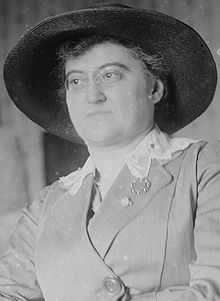Rosika Schwimmer
| Rosika Schwimmer | |
|---|---|
 | |
| Native name | Bédy-Schwimmer Rózsa |
| Born |
September 11, 1877 Budapest, Hungary |
| Died |
August 3, 1948 (aged 70) New York, New York, U.S. |
| Known for |
suffragist women's rights advocate pacifist |

Rosika "Rózsa" Bédy-Schwimmer (best known as Rosika Schwimmer, September 11, 1877 – August 3, 1948) was a Hungarian-born pacifist, feminist and female suffragist. She was one of the first world federalists.
Biography
Early years
Rosika Schwimmer was born to a Jewish family in Budapest in Austria-Hungary. She studied music and languages but when family finances deteriorated in 1896, she began to work as a bookkeeper.
Political career
In 1897 Schwimmer founded the Hungarian Feminist Association, helped to found Hungarian National Council of Women, later organized the first Women's Trade Union in Hungary and was a board member in the Hungarian Peace Society. In 1909, the Minister of the Interior appointed her to the governing board of child welfare.[1]
In 1913 she became a corresponding secretary of the International Woman Suffrage Alliance (IWSA). Schwimmer toured Europe with Carrie Chapman Catt to lecture on female suffrage. She also edited the magazine A nő (The Woman).[2] In 1914 Schwimmer moved to London and worked as a correspondent of various European newspapers and press secretary for IWSA.[3] When World War I broke out, she could not return home and began to agitate for the end of hostilities. In 1914 she toured the USA to demand that president Woodrow Wilson form a neutral conference to end the war. In 1915 she took part in the formation of the Woman's Peace Party.
At the International Congress of Women, 28 April - 10 May 1915, The Hague, Netherlands Schwimmer's proposal for a Neutral Conference for Continuous Mediation between the governments of the belligerents was adopted. Later that year she gained the support of Henry Ford, who chartered a Peace Ship to Stockholm. Disappointed with Ford's efforts, she later organized the International Committee for Immediate Mediation in June 1916. After the armistice, Schwimmer became vice-president of the Women's International League for Peace and Freedom.
When Hungary gained independence from Austria-Hungary in 1918, prime minister Mihály Károlyi appointed Schwimmer to be ambassador to Switzerland. When the communists gained control of the government in 1919, she opposed them and lost her civil rights. In 1920, when Miklós Horthy's government ousted the communists, she fled to Vienna and in 1921 to the USA. She settled in Chicago and did not move back to Hungary, where she had contributed to building the foundation for future women in Hungarian politics.
Due to her pacifist beliefs, Schwimmer was labeled as a socialist in the USA. She spent most of her remaining life fighting slander against her person. When Fred Marvin accused her of being a German spy and a Bolshevist agent, she sued and received $17,000 in damages. However, she could not gain US citizenship because of her pacifism—the U.S. Supreme Court ruled against her in United States v. Schwimmer (1929). In 1946, United States v. Schwimmer was overturned in Girouard v. United States. She spent the rest of her life in the country as a stateless person.
Later in life Schwimmer tried to create a world government. In 1935 she formed the World Centre for Women's Archives with Mary Ritter Beard. She received the World Peace Prize in 1937. At the same year she formed the Campaign for World Government with Lola Maverick Lloyd, the first World Federalist organization of the 20th century. Later in the 20th century, the federalist movement have successfully led the campaign and coalition for creating an International Criminal Court,[4] which Schwimmer rarely gets credit for.[5] In 1947 she was nominated for Nobel Peace Prize but had no chance of obtaining it as the prize was not awarded the next year.
Death and legacy
Rosika Schwimmer died of pneumonia on August 3, 1948 in New York City.
References
- ↑ http://jwa.org/encyclopedia/article/schwimmer-rosika
- ↑ http://www.yivoencyclopedia.org/article.aspx/Schwimmer_Rozsika
- ↑ Gerit von Leitner. Wollen wir unsere Hände in Unschuld waschen? Gertrud Woker (1878 - 1968), Chemikerin & Internationale Frauenliga 1915 - 1968. Berlin: Weidler, 1998, ISBN 3-89693-125-3, p. 99.
- ↑ http://www.iccnow.org/documents/WFM-IGP_2009_Annual_Report.pdf, page 6
- ↑ Ruttum, Laura (October 2005). Lola Maverick Lloyd Papers: 1856-1949. New York Public Library.
Further reading
- The Case of Rosika Schwimmer: Alien Pacifists Not Wanted! New York: American Civil Liberties Union, June 1929.
External links
- Rosika Schwimmer Papers, Manuscripts and Archives Division, The New York Public Library, New York, NY
- Schwimmer Family Papers, Manuscripts and Archives Division, The New York Public Library, New York, NY
- Digital images of Rosika Schwimmer from the Schwimmer-Lloyd Collection, Manuscripts and Archives Division, The New York Public Library, New York, NY
- Rosika Schwimmer Papers, Hoover Institution Archives, Stanford, CA
- Schwimmer-Lloyd Collection, Sophia Smith Collection, Smith College, Northampton, MA
- Rosika Schwimmer Papers, Swarthmore College Peace Collection, Swarthmore, PA
- Articles by Rosika Schwimmer in A nő és a társadalom and A Nő, Magyar Társadalomtudományok Digitális Archívuma
|